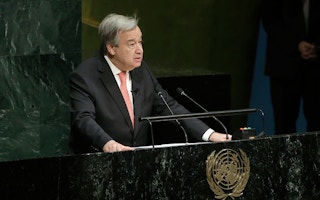Sworn in on 12 December as the ninth and next United Nations Secretary-General, António Guterres pledged to reposition development at the centre of the Organization’s work and ensure that the UN can change to effectively meet the myriad challenges facing the international community.
“The United Nations needs to be nimble, efficient and effective. It must focus more on delivery and less on process; more on people and less on bureaucracy,” said Mr. Guterres after taking the oath of office at a ceremony before the 193-member UN General Assembly.
Mr. Guterres, a former Prime Minister of Portugal (1995 to 2002) and former UN High Commissioner for Refugees (2005-2015) took the oath of office following the Assembly’s tribute to Secretary-General Ban Ki-moon, who steps down at the end of the month after leading the global Organization for the past 10 years.
At the onset of his remarks at the swearing-in-ceremony, the Secretary-General-designate paid tribute to Secretary-General Ban for his “principled leadership [that] helped to chart the future of the UN – through the 2030 Agenda for Sustainable Development; through [his] commitment to peace and security; through [his] initiative to put human rights at the heart of [UN’s] work.”
Mr. Guterres then highlighted three strategic priorities for the Organization: working for peace; supporting sustainable development; and reforming its internal management.
“
The United Nations needs to be nimble, efficient and effective. It must focus more on delivery and less on process; more on people and less on bureaucracy.
António Guterres, Secretary-General-designate, United Nations
Peace
Noting that, often, the UN is tasked with peacekeeping in places where there is no peace to keep, he said that a greater conceptual clarity and a shared understanding of the scope of peacekeeping was needed so as to pave the way for urgent reforms.
“Inspired by the new concept of sustaining peace, it is time for us all to engage in a comprehensive reform of the UN strategy, operational set-up and structures for peace and security,” he highlighted.
Mr. Guterres also emphasised the need to do more to prevent and respond to the sexual violence and exploitation committed by those serving under the UN flag against those they are supposed to protect.
“I will work closely with Member States on structural, legal and operational measures to make the zero-tolerance policy […] a reality,” he underscored, adding:
“We must ensure transparency and accountability – and offer protection and effective remedies to the victims.”
Sustainable development
On the second key element of the reform agenda, concerning the UN support to Member States in achieving the Sustainable Development Goals (SDGs), Mr. Guterres said that development will form the centre of the UN’s work, and that he will engage in a comprehensive reform of the UN development system – both at headquarters and at country levels.
“This must involve leadership, coordination, delivery and accountability. We will build on the outcome of the recent discussions among Member States,” he said, underlining the need to bring humanitarian and development spheres closer together from the very beginning of a crisis.
“Humanitarian response, sustainable development and sustaining peace are three sides of the same triangle,” he highlighted.
Management reform
On management reforms, Mr. Guterres underlined the need to build on existing efforts and to implement recent reform initiatives.
“Looking at UN staff and budgetary rules and regulations, one might think some of them were designed to prevent, rather than enable, the effective delivery of our mandates,” he said, adding: “It benefits no one if it takes nine months to deploy a staff member to the field.”
This story was published with permission from the UN News Centre. Read the full story.










